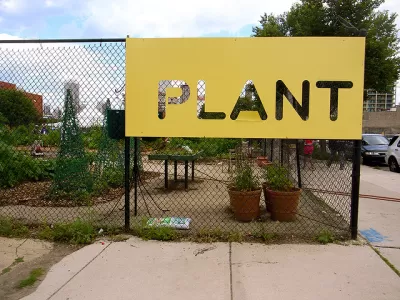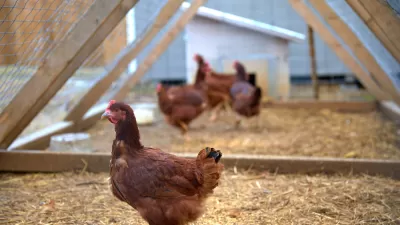It can be easier for Chicago's urban gardeners to grow produce than to sell it.

Urban agriculture is not new, and while the practice experienced a boom in the 1970s, "Chicago’s city planners were slow to catch up to the ubiquity of the city’s gardens and farms," Christian Belanger argues in Southside Weekly.
Advocates for urban farming like Ken Dunn, founder of the Resource Center, want simple licensing for the community gardens and urban farms. Dunn's organization runs City Farm, which is a moving farm that has grown produce on the city's north and south sides in various vacant locations. "Dunn believes the city should institute the City Farm model on a large scale, temporarily turning many of the city’s vacant properties into short-term urban farms that would benefit communities with high unemployment rates," Belanger reports. To serve these goals Dunn believes the city should make it straightforward to license these businesses.
"Actually selling their products, though, has been a surprisingly tricky process for many farmers to navigate. Currently, farmers largely have two business licenses available to them: a peddler’s license for small-scale farmers, and a wholesale license for bigger operations," Belanger reports. A peddler's license requires each person involved to buy a license, which can be expensive and may slow these businesses from hiring, and the wholesale license has a number of requirements around infrastructure and inspection. As a result, many of the urban farms in the city operate without a license in a legal grey area.
FULL STORY: License to Grow

Maui's Vacation Rental Debate Turns Ugly
Verbal attacks, misinformation campaigns and fistfights plague a high-stakes debate to convert thousands of vacation rentals into long-term housing.

Planetizen Federal Action Tracker
A weekly monitor of how Trump’s orders and actions are impacting planners and planning in America.

In Urban Planning, AI Prompting Could be the New Design Thinking
Creativity has long been key to great urban design. What if we see AI as our new creative partner?

Pedestrian Deaths Drop, Remain Twice as High as in 2009
Fatalities declined by 4 percent in 2024, but the U.S. is still nowhere close to ‘Vision Zero.’

King County Supportive Housing Program Offers Hope for Unhoused Residents
The county is taking a ‘Housing First’ approach that prioritizes getting people into housing, then offering wraparound supportive services.

Researchers Use AI to Get Clearer Picture of US Housing
Analysts are using artificial intelligence to supercharge their research by allowing them to comb through data faster. Though these AI tools can be error prone, they save time and housing researchers are optimistic about the future.
Urban Design for Planners 1: Software Tools
This six-course series explores essential urban design concepts using open source software and equips planners with the tools they need to participate fully in the urban design process.
Planning for Universal Design
Learn the tools for implementing Universal Design in planning regulations.
planning NEXT
Appalachian Highlands Housing Partners
Mpact (founded as Rail~Volution)
City of Camden Redevelopment Agency
City of Astoria
City of Portland
City of Laramie



























